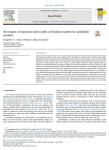Li T., Messer K.D., Kaiser H.M. (2020). The impact of expiration dates labels on hedonic markets for perishable products. Food policy, 01/05/2020, vol. 93, p. 1-12.
https://doi.org/10.1016/j.foodpol.2020.101894
https://doi.org/10.1016/j.foodpol.2020.101894
| Titre : | The impact of expiration dates labels on hedonic markets for perishable products (2020) |
| Auteurs : | T. Li ; K.D. Messer ; H.M. Kaiser |
| Type de document : | Article |
| Dans : | Food policy (vol. 93, May 2020) |
| Article en page(s) : | p. 1-12 |
| Langues : | Anglais |
| Langues du résumé : | Anglais |
| Catégories : |
Catégories principales 08 - ALIMENTATION ; 8.5 - Législation et NormesThésaurus IAMM ETIQUETAGE DES PRODUITS ; LABEL DE QUALITE ; PROTECTION DU CONSOMMATEUR ; REGLEMENTATION ; DECHET ALIMENTAIRE ; COMPORTEMENT DU CONSOMMATEUR ; PRODUIT ALIMENTAIRE ; ENQUETE ; ENQUETE AUPRES DES CONSOMMATEURS |
| Résumé : | This study draws inferences from a pre-registered field experiment to investigate how expiration dates impact consumer preferences for food products with different ages. Based on a power analysis, we recruited 373 adult participants for the experiment. The results demonstrate that expiration dates largely influenced the perceived freshness of a food product as they seem to indicate a quality standard. When no explicit expiration date was present, consumers believed that the product?s quality decreased monotonically as time passed. However, in the presence of an expiration-date label, consumers initially perceived the product as more acceptable, but then that perception changed quickly after the date of expiration to levels more consistent with what they would perceive if the expiration date was not present. These results support policies that label expiration dates for consumers, as these labels benefit consumers, producers, and the public, especially for times prior to the expiration date. These results also suggest that it is important to craft policy and market strategies for products that are past the expiration date, but are still safe to consume. Policies that set the expiration dates to the time where the taste quality begins to worsen would likely benefit both consumers and producers, while policies that set the expiration dates to the time where the food is no longer safe probably improve the public outcomes as it minimizes food waste. |
| Cote : | Réservé lecteur CIHEAM |
| URL / DOI : | https://doi.org/10.1016/j.foodpol.2020.101894 |







